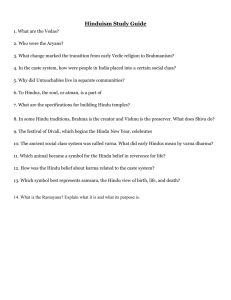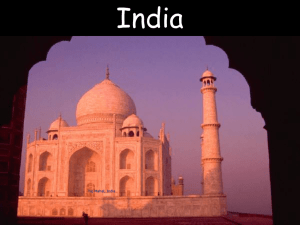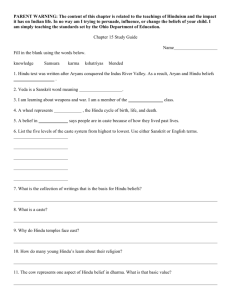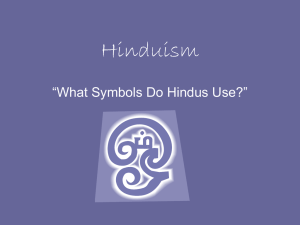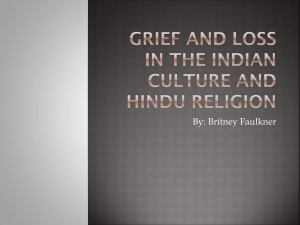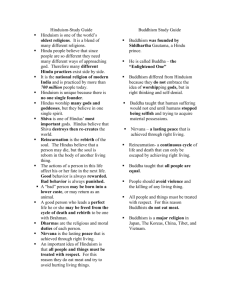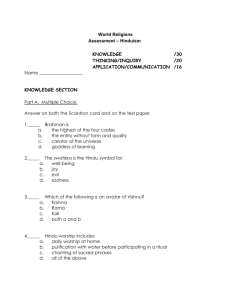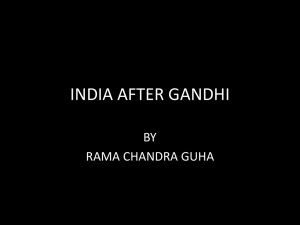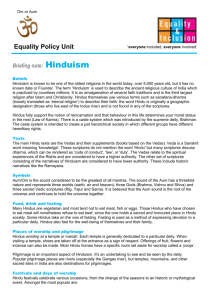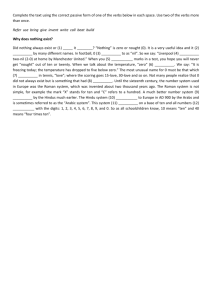CARING FOR THE HINDU PATIENT
advertisement
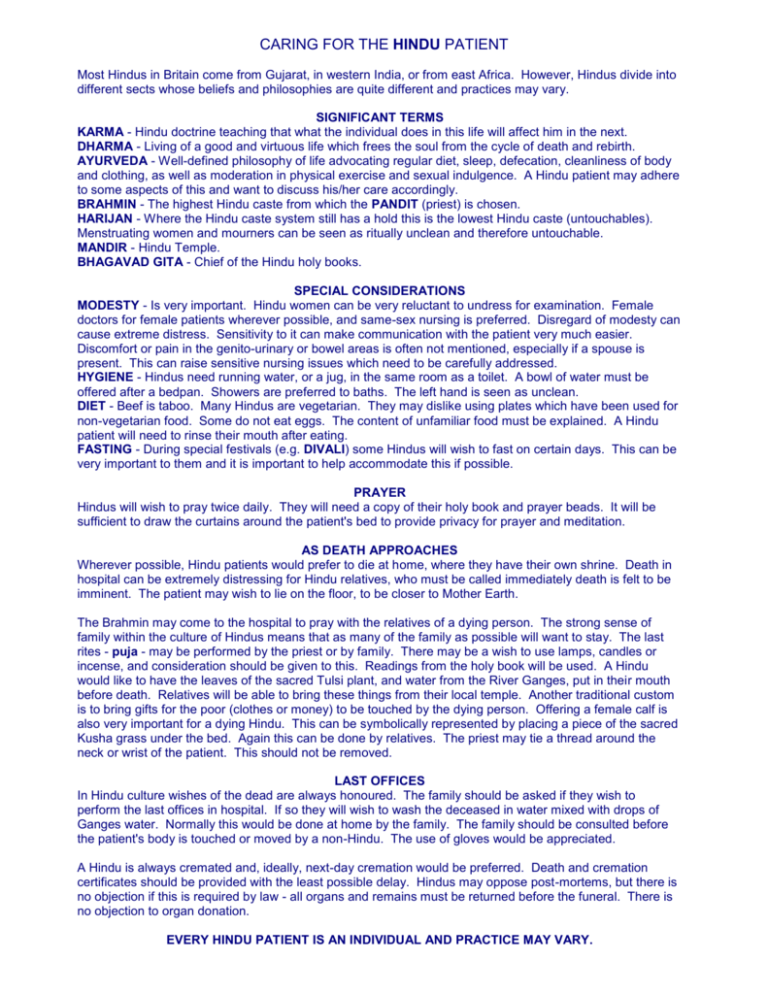
CARING FOR THE HINDU PATIENT Most Hindus in Britain come from Gujarat, in western India, or from east Africa. However, Hindus divide into different sects whose beliefs and philosophies are quite different and practices may vary. SIGNIFICANT TERMS KARMA - Hindu doctrine teaching that what the individual does in this life will affect him in the next. DHARMA - Living of a good and virtuous life which frees the soul from the cycle of death and rebirth. AYURVEDA - Well-defined philosophy of life advocating regular diet, sleep, defecation, cleanliness of body and clothing, as well as moderation in physical exercise and sexual indulgence. A Hindu patient may adhere to some aspects of this and want to discuss his/her care accordingly. BRAHMIN - The highest Hindu caste from which the PANDIT (priest) is chosen. HARIJAN - Where the Hindu caste system still has a hold this is the lowest Hindu caste (untouchables). Menstruating women and mourners can be seen as ritually unclean and therefore untouchable. MANDIR - Hindu Temple. BHAGAVAD GITA - Chief of the Hindu holy books. SPECIAL CONSIDERATIONS MODESTY - Is very important. Hindu women can be very reluctant to undress for examination. Female doctors for female patients wherever possible, and same-sex nursing is preferred. Disregard of modesty can cause extreme distress. Sensitivity to it can make communication with the patient very much easier. Discomfort or pain in the genito-urinary or bowel areas is often not mentioned, especially if a spouse is present. This can raise sensitive nursing issues which need to be carefully addressed. HYGIENE - Hindus need running water, or a jug, in the same room as a toilet. A bowl of water must be offered after a bedpan. Showers are preferred to baths. The left hand is seen as unclean. DIET - Beef is taboo. Many Hindus are vegetarian. They may dislike using plates which have been used for non-vegetarian food. Some do not eat eggs. The content of unfamiliar food must be explained. A Hindu patient will need to rinse their mouth after eating. FASTING - During special festivals (e.g. DIVALI) some Hindus will wish to fast on certain days. This can be very important to them and it is important to help accommodate this if possible. PRAYER Hindus will wish to pray twice daily. They will need a copy of their holy book and prayer beads. It will be sufficient to draw the curtains around the patient's bed to provide privacy for prayer and meditation. AS DEATH APPROACHES Wherever possible, Hindu patients would prefer to die at home, where they have their own shrine. Death in hospital can be extremely distressing for Hindu relatives, who must be called immediately death is felt to be imminent. The patient may wish to lie on the floor, to be closer to Mother Earth. The Brahmin may come to the hospital to pray with the relatives of a dying person. The strong sense of family within the culture of Hindus means that as many of the family as possible will want to stay. The last rites - puja - may be performed by the priest or by family. There may be a wish to use lamps, candles or incense, and consideration should be given to this. Readings from the holy book will be used. A Hindu would like to have the leaves of the sacred Tulsi plant, and water from the River Ganges, put in their mouth before death. Relatives will be able to bring these things from their local temple. Another traditional custom is to bring gifts for the poor (clothes or money) to be touched by the dying person. Offering a female calf is also very important for a dying Hindu. This can be symbolically represented by placing a piece of the sacred Kusha grass under the bed. Again this can be done by relatives. The priest may tie a thread around the neck or wrist of the patient. This should not be removed. LAST OFFICES In Hindu culture wishes of the dead are always honoured. The family should be asked if they wish to perform the last offices in hospital. If so they will wish to wash the deceased in water mixed with drops of Ganges water. Normally this would be done at home by the family. The family should be consulted before the patient's body is touched or moved by a non-Hindu. The use of gloves would be appreciated. A Hindu is always cremated and, ideally, next-day cremation would be preferred. Death and cremation certificates should be provided with the least possible delay. Hindus may oppose post-mortems, but there is no objection if this is required by law - all organs and remains must be returned before the funeral. There is no objection to organ donation. EVERY HINDU PATIENT IS AN INDIVIDUAL AND PRACTICE MAY VARY.
